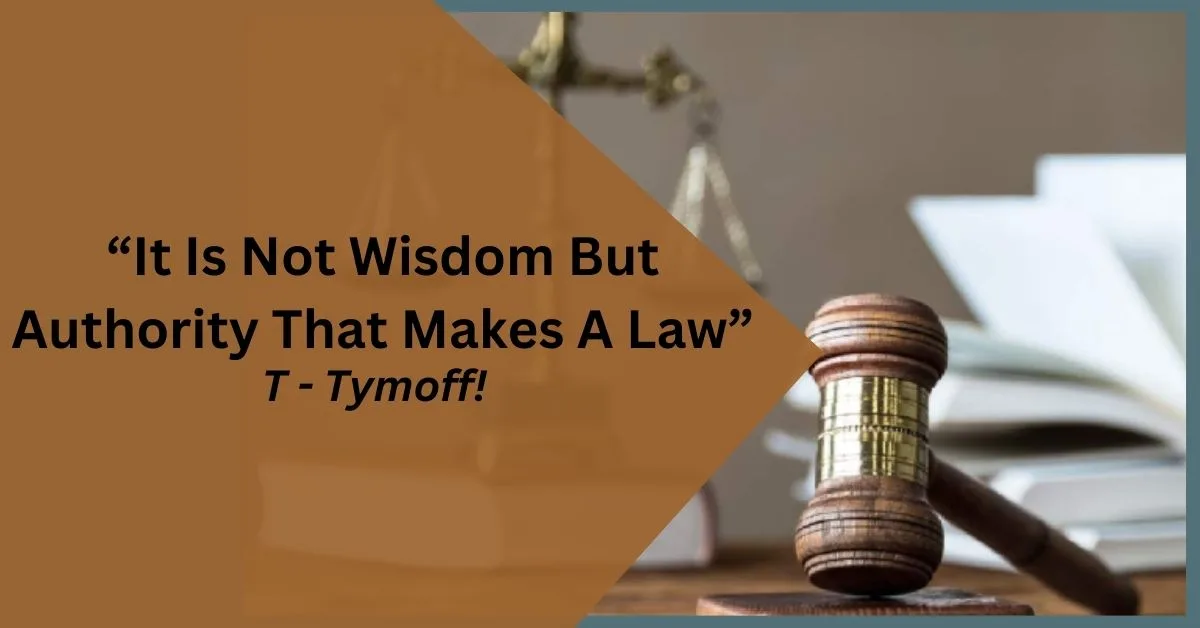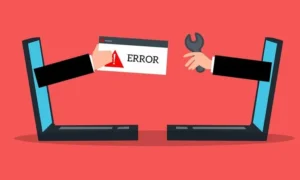it is not wisdom but authority that makes a law. t – tymoff
Imagine a world where every law was made based solely on wisdom. Sounds ideal, right? But what if I told you that it’s not wisdom but authority that makes a law? This thought-provoking perspective, attributed to Tymoff, challenges our it is not wisdom but authority that makes a law. t – tymoff conventional understanding of lawmaking. So, let’s dive into this fascinating concept and see why authority, rather than wisdom, holds the key to creating laws.
Understanding Authority vs. Wisdom
First, let’s break down it is not wisdom but authority that makes a law. t – tymoff what we mean by wisdom and authority. Wisdom is the ability to make sound decisions based on knowledge, experience, and good judgment. It’s something we all admire and strive for. Authority, on the other hand, is the power or right to give orders, make decisions, and enforce obedience. It’s often associated with positions of power, such as government officials or law enforcement.
While wisdom is undoubtedly it is not wisdom but authority that makes a law. t – tymoff valuable, it’s not always enough to create and enforce laws. Think about it: you might have the wisest person in the world come up with the most brilliant law, but without the authority to enforce it, that law is just an idea. Authority provides the structure and power necessary to implement and uphold laws.
The Role of Authority in Lawmaking
Authority is the backbone of any legal system. It gives laws their teeth, ensuring they are followed and respected. Without authority, laws would lack the necessary enforcement mechanisms to be effective. This is why governments and institutions play a crucial role in lawmaking.
Consider the process of passing a new law. It starts with an idea, often proposed by someone in a position of authority, such as a legislator it is not wisdom but authority that makes a law. t – tymoff. This idea is then debated, revised, and eventually voted on by a group of individuals who have the authority to make such decisions. Once passed, the law is enforced by various authorities, including police officers and judges. At every stage, authority is key to transforming an idea into a binding law.
Wisdom Alone is Not Enough
Now, let’s explore why wisdom it is not wisdom but authority that makes a law. t – tymoff alone is not sufficient for lawmaking. Wisdom can guide us toward creating fair and just laws, but it lacks the power to enforce those laws. A wise individual might understand the need for a particular law and even draft it perfectly. However, without the backing of authority, that law remains powerless.
Imagine a community where a wise elder proposes a law to reduce pollution. Everyone agrees that it’s a great idea, but without the authority to enforce it, people might not feel compelled to follow it. The law might be ignored, and the community continues to suffer from pollution. In this scenario, wisdom provided the insight, but authority is needed to turn that insight into action.
The Balance Between Wisdom and Authority
While authority is crucial, it should not overshadow the importance of wisdom in lawmaking. Ideally, laws should be created by those who possess both wisdom and authority. This balance ensures that laws are not only enforceable but also fair and just.
For instance, a wise and authoritative leader can craft laws that reflect the needs and values of their society while ensuring those laws are effectively implemented. This balance helps prevent the abuse of power and ensures that laws serve the greater good.
The Danger of Authority Without Wisdom
On the flip side, authority without wisdom can lead to unjust and oppressive laws. When those in power lack wisdom, they might create laws that serve their interests rather than the common good. This can result in a society where laws are used as tools of control rather than instruments of justice.
History provides numerous examples of this. Authoritarian regimes often pass laws that suppress dissent and violate human rights. These laws are enforced with an iron fist, but they lack the moral and ethical grounding that wisdom provides it is not wisdom but authority that makes a law. t – tymoff. This highlights the importance of having wise individuals in positions of authority.
Real-World Examples
Let’s look at some real-world examples to illustrate the interplay between wisdom and authority in lawmaking. One notable example is the civil rights movement in the United States. The movement was driven by wise leaders like Marti it is not wisdom but authority that makes a law. t – tymoff Luther King Jr., who envisioned a just and equal society. However, it took the authority of the government, through legislation and court rulings, to bring about significant changes, such as the Civil Rights Act of 1964.
Another example is environmental law. Scientists and environmentalists have long warned about the dangers of climate change. Their wisdom is crucial in understanding the problem and proposing solutions. However, it requires the authority of governments and international bodies to implement and enforce environmental regulations that can make a real impact.
The Role of Public Opinion
Public opinion also plays a role in the relationship between wisdom and authority in lawmaking. In democratic societies, leaders are elected based on their perceived wisdom and ability to wield authority effectively. Public support can bolster the authority of leaders, making it easier for them to pass and enforce laws.
For example, during the COVID-19 pandemic, public health experts provided the wisdom needed to navigate the crisis. However, it was the authority of governments that implemented lockdowns, mask mandates, and vaccination programs. Public opinion varied, but in many cases, widespread support for these measures helped ensure compliance and effectiveness.
The Future of Lawmaking
As we move into the future, the interplay between wisdom and authority in lawmaking will continue to evolve. Technological advancements, such as artificial intelligence and big data, have the potential to enhance both wisdom and authority. AI can provide insights based on vast amounts of data, while digital governance platforms can streamline the lawmaking process and improve enforcement.
However, these advancements also come with challenges. Ensuring that AI and other technologies are used ethically and responsibly requires both wisdom and authority. As we navigate these changes, the balance between wisdom and authority will remain crucial to creating fair and effective laws.
Conclusion
In conclusion, while wisdom is invaluable in guiding the creation of fair and just laws, it is authority that gives those laws their power and enforceability. Tymoff’s insight reminds us that authority is essential to transforming wise ideas into actionable laws. However, a balance between wisdom and authority is necessary to ensure that laws serve the greater good and do not become tools of oppression. As we look to the future, maintaining this balance will be key to navigating the complexities of lawmaking in an ever-changing world














Post Comment